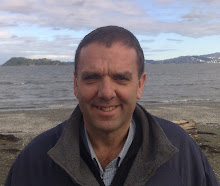
It is not easy navigating in a landscape devoid of familiar markers. My family and I have now been in New Zealand for nearly a year. There have been a whole host of things for us to adapt to: giving way to right-turning traffic, paying for medical bills, different Weetbix and the pronunciation of vowels. This cuts both ways, of course. In the UK, I have met with Kiwis adjusting to queuing in post offices, driving on motorways and living without pineapple lumps, milo and friendly faces.
I am not sure that we feel entirely at home anywhere at the moment. I can empathise with the question: “How Shall we Sing the Lord’s Song in a Strange Land?” It is a vital question, which has implications not just for the dislocated but for all believers, even those who have never left the land of their birth. How do the people of God live in an alien environment with opposing values, morals, ideas and religious philosophies?

How does anyone live as a minority community in wider society? Through history there have been three main approaches to this issue:
• Assimilation–where the minority loses its distinctiveness and becomes absorbed into the collective culture, perhaps contributing something of value in the process.
• Isolation–where the minority withdraws and attempts to isolate and inoculate itself from the majority.
• Colonisation–where the minority changes the majority culture so that it becomes like them, taking on their values and characteristics.
I believe that a key problem of the church through history and of the church in Western culture is that we have conceived of our role in society through one of these approaches. Assimilation is the mistake of the liberal; giving the unbeliever less and less to disbelieve. Isolation is the error of the pietistic; abrogating responsibility for wider society while constructing an irrelevant haven. Colonisation is the fallacy of Christendom; seeking to influence positively but unable to untangle the eternal from the temporal.
The Bible presents us with a powerful alternative approach to the problem: the notion of Exile. I believe the rediscovery of this radical fourth approach is vital for the people of God today, and provides a prophetic theme for TSCF to pick up in these days.
The Exile was extremely significant in the history of the people of Israel. All the things that had been seen as key to their identity, security and prosperity were lost. Yet, when we read the scriptures, we see that in Exile a new paradigm for being the people of God emerges. Israel’s identity is rooted primarily in their relationship with God and in a future hope connected to his promises. They are to love and serve the Lord; they are to make an impact where they are, but they are to live with the hope of a future return. They are to seek the welfare of the city, build houses, plant crops and have children. But they are to get involved in Babylon remembering that they are not Babylonians and that in 70 years time God will rescue them and take them back to where they belong.
Exile is a powerful paradigm for the church in the world today. We are called to live as a faith community in enemy territory, with one eye on the future. As believers, we live as aliens and strangers in the world, fully engaged but waiting for Christ’s return.

To do this effectively our identity needs to be centred on the gospel. We need a fresh confidence in biblical, cross- centred evangelism, which clearly focuses on Jesus. The gospel is not uncertain, since God has revealed himself to us in his word. The truth is not simplistic but it is simple. It is not an abstract concept. It is rooted in the person and work of Jesus, centred on his death and resurrection, and orientated towards his future return.
In Nigeria, I once met a businessman who had been an international student in the UK in the late ’90s. “Nobody knows what church stands for anymore”, he told me. “I was searching for certainty, looking for absolutes. I was attracted by the teaching and person of Jesus and by the clarity of the scriptures. But the modern church in Britain has abandoned this simplicity for a sophisticated irrelevance. That is why I turned to Islam.” The persuasive articulation of truth is vital if people are to understand the gospel, which defines our identity and delivers salvation and hope.
We also must be discovering new ways of being the people of God today. The triangle between where people live, work and worship is getting bigger all the time. The structures that served the gospel in the last century are not necessarily going to serve them this century. Over the past year we have been considering the transition of graduates into the workplace. Many graduates are entering professions or businesses where they will live as a minority.
Connecting Christians at work, encouraging them to sing the Lord’s song together rather than just whistle their own tune, and resourcing them in evangelism is the great opportunity and challenge of today.
Our Graduate Initiative will seek to facilitate the transition from final year student to first year of work through short term mentoring programmes and resources. We are starting to put resources on the web site which are relevant to particular professions. Initially we are targeting medicine, law, nursing, teaching and business. This will be supported and complemented by a physical professional resource centre in Wellington.
We are also developing strategies which will help make OE a more positive spiritual experience through international networks and we are looking to better support international students as they return to their home culture. Churches around the world are increasingly realising the importance of being more intentional in equipping members for work. It is both a means of honouring God and of involvement at the heart of society. Proper engagement with the marketplace is absolutely vital if we are to be salt and light in the world. The workplace is the vital arena for most Christians to connect with culture, share faith, build relationships and manifest the essential difference that Christ makes through word and action. We want to be at the cutting edge of this in New Zealand.
We must be God’s people and bring colour to the washed out landscapes of communities that are living away from Him. As we sing the Lord’s song in a strange land, may our music lead many lost people home.
From "Canvas" November 06

No comments:
Post a Comment